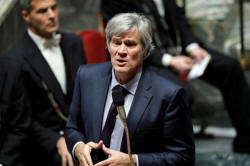|
 France
sees bird flu crisis nearly over as spread slows France
sees bird flu crisis nearly over as spread slows
 Send a link to a friend
Send a link to a friend
[March 21, 2017] PARIS
(Reuters) - The spread of a severe bird flu virus that ravaged the duck
industry in southwestern France since late last year has slowed in the
past two weeks, suggesting the crisis could be ending, the farm minister
said on Monday.
|
|
 France, which has the largest poultry flock in Europe, has been
among the countries most severely hit by the highly pathogenic H5N8
bird flu virus that propagated in Europe, the Middle East and
Africa. France, which has the largest poultry flock in Europe, has been
among the countries most severely hit by the highly pathogenic H5N8
bird flu virus that propagated in Europe, the Middle East and
Africa.
"Everything suggests that we will soon reach the end of this
outbreak. The number of suspected cases is in sharp decline," French
Agriculture Minister Stephane Le Foll told reporters.
"We can see the end of this terrible tunnel in which we have been
for four months," he said.
Some 465 outbreaks of H5N8 have been detected and 4 million poultry
destroyed because of the virus, mainly in southwestern France, home
to most foie gras producers.

The fast spread of bird flu has prompted the government to order a
massive cull of ducks, higher security measures and the fallowing of
farms in part of the southwest since January.
H5N8 detected in France is not transmissible by food and has never
been found in humans. It is different than the H7N9 strain that has
caused the death of over 160 people in China since late last year in
the worst outbreak since 2009.
Chicken production, less exposed to H5N8, has resumed in some
regions where the virus is considered to be under control and the
area will be extended gradually to most of the southwest in coming
weeks, Le Foll said.
Duck farmers will be able to resume production in restricted areas
by the end of May at the latest, as initially planned, provided the
situation remains stable.
[to top of second column] |

Ducks and geese, mostly produced for their livers that are
artificially swollen through force-feeding to make foie gras, are
most exposed to the virus due to free-range rearing and transport of
animals between farms.
Le Foll also promised to reimburse in due time farmers' lack of
earnings when they culled their birds or halted production due to
bird flu. He was answering growing criticism that delays in public
aid had threatened many farmers' businesses.
Foie gras producers this month said the crisis would lead to a rise
in prices of the delicacy and suggested a change in production
methods to protect poultry flocks.
(Reporting by Sybille de La Hamaide; Editing by Dale Hudson)
[© 2017 Thomson Reuters. All rights
reserved.] Copyright 2017 Reuters. All rights reserved. This material may not be published,
broadcast, rewritten or redistributed.
 |